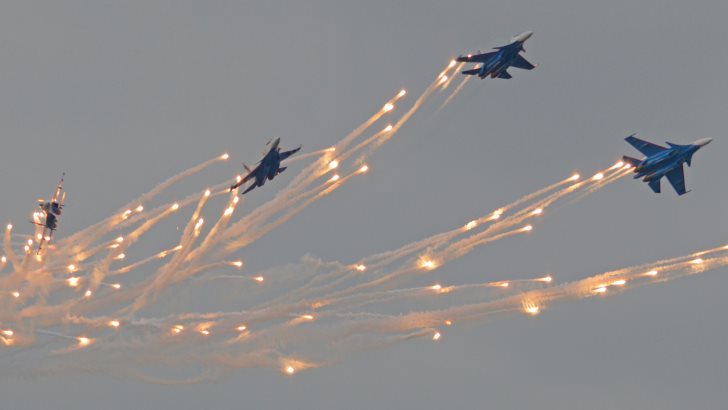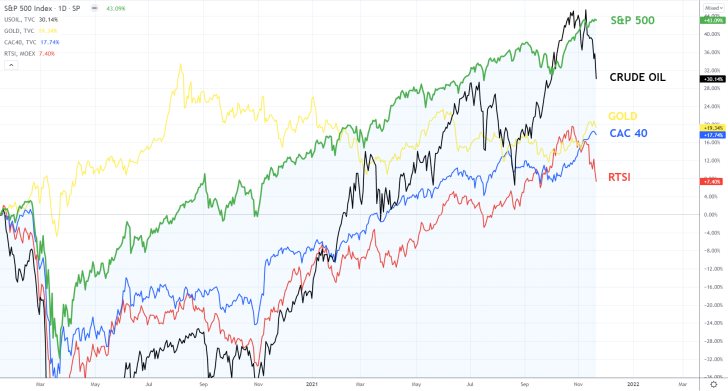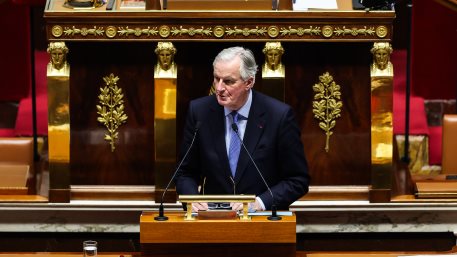
It has been a real rollercoaster of a year so far, with major ups and downs in the global efforts to manage the pandemic, the beginning of Biden's presidency, persisting distortions of the global supply chains and soaring inflation, but it looks as though even now political tensions could escalate very quickly. Russia has amassed tens of thousands of troops near its border with Ukraine, in what many have started to fear could pan out to be a repeat of the 2014 invasion.
What has been the political response so far?
Jens Stoltenberg, Nato Secretary General, commented on Friday the unusual size and concentration of troops near the border, which could potentially be a prelude to an incursion by Russia into the Donbas region of Ukraine. U.S. intelligence agencies have warned Western allies against possible Russian aggression as temperatures start to drop.
So far, Russian officials have been dismissing NATO's concerns, claiming that stationing troops within the country's borderlines is a matter of internal affairs. Such muscle-flexing has long been part of Russian intimidation tactics, which is why misreading the situation by either side could escalate tensions very rapidly. Russia's foreign ministry has already alleged that the U.S. response is really a political ploy by republicans to gain further momentum, which could hardly calm down nerves in Kiev.
Attempts by certain 🇺🇸 congressmen to engage in self-promotion through utter Russophobia are doomed to failure. It just makes them look ridiculous and yield no results. Instead of trying to interfere in🇷🇺internal affairs, it's time for legislators to tackle the situation at home. pic.twitter.com/C5a6kGc9kK
— Russian Embassy in USA 🇷🇺 (@RusEmbUSA) November 19, 2021
And while Russia and the U.S. continue to be passing the diplomatic ball to each other's court, France, the first major European state to take a stance, tried to play hardball with Putin. In an interview for LCI television on Sunday, French foreign minister Jean-Yves Le Drian warned Russia of 'grave consequences' should it invade its southern neighbour.
France, still reeling from its recent political exclusion from a major arms deal between allies U.S. and Britain, appears adamant to reaffirm its leader status in the global political arena. This is becoming an increasingly more pressing issue for the country, with less than two months remaining before it takes on the Presidency of the Council of the EU.
🇫🇷🇪🇺 | 44 days to go before France takes on the Presidency of the Council of the European Union.
— France Diplomacy🇫🇷 (@francediplo_EN) November 19, 2021
🇪🇺 is taking on ambitious measures to make EU the world's first green continent !#EU2020FR pic.twitter.com/hlQkYIyP9E
Moreover, Macron's government would likely attempt to dissuade Putin early on into the diplomatic spat from any military actions. The goal would be to avoid additional backlash similar to the wave of criticisms for inaction that was directed towards European leaders back in 2014.
Russia's incursion in Ukraine several years ago showed just how woefully unprepared European states were to mitigate a major conflict so close to home. Macron would most probably seek to avoid embroiling the Union in a repeat of 2014.
The question is whether Putin can really be pressured politically by a weakened Europe, given his strong opposition to a broader array of questions. Especially since the resolution to Europe's energy crisis still hinges on Putin's willingness to satisfy the bloc's massive demand for natural gas.
The market's reaction, likely economic ramifications
So far, markets have remained relatively unfazed by the sporadic diplomatic fire and rhetoric barrages across the border between Russia and Ukraine, and investors seem to downplay the risk of a Russian incursion into the Donbas region.

Gold, as the penultimate safe-haven asset, has been climbing moderately over the past several weeks, though a bearish correction in the near term seems highly probable. This represents the most significant indication that the market does not expect the situation to continue escalating much further than that.
U.S. stocks, represented by the S&P index on the daily chart above, continue advancing further up north, whereas the Russian RTSI index has been diving over the last few days. The extra bearish bias on Russian stocks is prompted by the political pressure currently exerted by the West. The opposite effect is being registered by the French CAC 40 index.
The price of crude oil finally started correcting itself following the massive rally triggered by the above-mentioned energy squeeze. This represents another definite sign that investors remain optimistic concerning the global economic prospects until the end of the year.




















